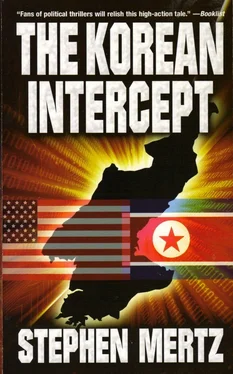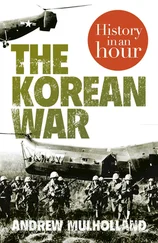Stephen Mertz - The Korean Intercept
Здесь есть возможность читать онлайн «Stephen Mertz - The Korean Intercept» весь текст электронной книги совершенно бесплатно (целиком полную версию без сокращений). В некоторых случаях можно слушать аудио, скачать через торрент в формате fb2 и присутствует краткое содержание. Жанр: Триллер, на английском языке. Описание произведения, (предисловие) а так же отзывы посетителей доступны на портале библиотеки ЛибКат.
- Название:The Korean Intercept
- Автор:
- Жанр:
- Год:неизвестен
- ISBN:нет данных
- Рейтинг книги:3 / 5. Голосов: 1
-
Избранное:Добавить в избранное
- Отзывы:
-
Ваша оценка:
- 60
- 1
- 2
- 3
- 4
- 5
The Korean Intercept: краткое содержание, описание и аннотация
Предлагаем к чтению аннотацию, описание, краткое содержание или предисловие (зависит от того, что написал сам автор книги «The Korean Intercept»). Если вы не нашли необходимую информацию о книге — напишите в комментариях, мы постараемся отыскать её.
The Korean Intercept — читать онлайн бесплатно полную книгу (весь текст) целиком
Ниже представлен текст книги, разбитый по страницам. Система сохранения места последней прочитанной страницы, позволяет с удобством читать онлайн бесплатно книгу «The Korean Intercept», без необходимости каждый раз заново искать на чём Вы остановились. Поставьте закладку, и сможете в любой момент перейти на страницу, на которой закончили чтение.
Интервал:
Закладка:
Calhoun, the CIA Director, said, "We have satellites over China probing the region, but it's just now dawn over there." He was a pale-skinned man in a dark suit, with a computer-like mind. He spoke crisply. "So far we have no satellite imagery of Liberty, and the GPS infrared sensors haven't tracked it by heat. But that doesn't mean it's not down there. We've retasked our birds up over that region to photograph from every angle. It's been snowing off and on all night in that region, and that could have cooled the shuttle faster than usual. That could fool the heat sensors. What puzzles me is that we haven't picked up a signal from her Emergency Locator transmitter. And each of those astronauts is equipped with an individual 74 emergency radio, but they're not sending locator signals."
McMann returned to his seat. "This whole damn thing is out of left field. It doesn't add up."
The president looked up from the map. "Anything new from the Chinese or the North Koreans?"
Gorman, the secretary of state, shook his head no. "We're still collecting information. Both countries disavow any knowledge of Liberty going down in either airspace." The secretary affected a rumpled appearance, at odds with his hard-nosed mastery of international diplomacy. "They've each pledged cooperation."
"We have initiated an intelligence directive, with our Yokohama station as the hub," Calhoun interjected.
"But why don't we already have a search and salvage operation underway?" asked the president.
Gorman cleared his throat. "You have to appreciate, sir, how fast this is breaking. The shuttle was launched only hours ago. Both China and North Korea are muddled in bureaucracy."
The president's eyes grew steely. "I don't give a damn. We should already have a search and rescue mission en route over there to supervise. No stalling. We can't let them get away with that."
"Such a course would lead to a serious confrontation, Mr. President," Gorman pointed out.
MacDonald, the secretary of defense, tugged irritably at an earlobe. He was of a bulky build, another ex-military man, with a permanent five o'clock shadow. "You want serious? Our nuke forces are going from DefCon Four to DefCon Three."
Christ, thought the president. Korea.
Relations with China would stand the strain of just about anything these days. Beijing had gotten used to capitalism and liked it. The Korean problem, on the other hand, was a bad hangover from the Cold War. Not much had changed in the status quo between America and Korea in more than fifty years. But that was about to change. North Korea continued a nuclear arsenal buildup. He couldn't get out of his mind the words of his defense secretary during a previous, unrelated briefing: "Anyone who speaks with certainty about North Korea is not speaking with wisdom."
Available intelligence reports were estimating that the North presently had a formidable one million-man army. Pyongyang spent twenty-five percent of its GNP on arms. About one million of their armed-to-the-teeth soldiers eyeballed a U.S. military force across a DMZ; two awesome armies squared off in their bunkers behind the world's most fortified potential killing field. Significant elements within the North Korean military were hawkish on a possible nuclear standoff with the West. If war broke out, U.S. troops would be their main target.
The president turned to his national security advisor. "A military confrontation with North Korea?"
Latisha Samuels was a middle-aged African American woman whose background in the military and academia had marked her with a no-nonsense, can-do demeanor. "Our fleet is waiting for orders to deploy."
The President paused to consider. "We must proceed under the assumption that some salvageable debris does remain of Liberty, and that there are survivors on the ground over there, no matter how slim that possibility is. No one today remembers the crew of the Pueblo. That was a spy ship, and the North Koreans held its crew for more than a year. With a defense systems satellite aboard, anyone who gets their hands on the Liberty will have themselves a treasure of scientific data. I don't trust the Chinese or the North Koreans. I don't care how nicey-nice we've been making with Beijing over these trade agreements. If only we had some idea what happened to Liberty. Going down over there in that godforsaken corner of the world… a pure accident?" He glanced around the table.
General McMann said, "It is not entirely impossible that someone could have penetrated the shuttle's computerized control and programmed a deviation into their flight guidance system. There are two thousand sensors and data points in Liberty's computer system. The computers could have been fooled into sending the wrong signals."
"Are you saying," the president asked slowly, "that someone could take command of an American space shuttle in orbit and direct it to land anywhere they wanted?"
"Only if the transmissions between the shuttle and Houston were scrambled, so the pilots could be conned into believing that ground control was ordering the deviation. In fact, Commander Scott would have to be conned into thinking the mission was being aborted."
"If we accept that," said Calhoun, "how likely is it that someone at the Johnson Space Center had a hand in it?"
"That's a primary probability," said McMann. "That is, if we accept the scenario."
The president rapped the table in front of him decisively. "This is too important to close our minds to anything. Okay. The media blackout stands for now. No background leaks to the press until we have a better handle on this." He turned to MacDonald. "Mac, tell the Pentagon I want a situation update every fifteen minutes."
"Yes, Mr. President."
"And one thing more."
"Sir?"
"Get me Trev Galt."
Meiko Kurita signed off on her report for the satellite feed to Tokyo. While her cameraman packed his gear, she studied the now-vacant podium at the end of the long, low-ceilinged room where John Halliday, the president's press secretary, had presided for the preceding half hour, fielding questions at his daily session with the White House press corps. The print media journalists had already left to write their stories, while correspondents of the electronic media filed their reports against the stock backdrop of the podium, the presidential seal clearly visible, before dispersing under the watchful eye of the administration's spin doctors. Meiko's instincts told her that something was wrong. She wondered if any of the thirty or so others present had sensed it. Perhaps the camera caught it. The camera never blinked, or so they said.
She realized again how jaded she had become in so short a time, from the college girl who dreamed of a job in a profession that in Japan was almost completely dominated by men, much like every other profession in that conservative, virtually male-dominated society, to the woman who now embodied that dream. In Japan, women were still very much expected to play a secondary role. Little had changed since her mother's time. Japanese society made it nearly impossible for a woman to adopt a lifestyle that differed from the traditional housebound role. This was reinforced by the pervasive tendency among men and women in her home country to accept things as they are, rather than disturbing the social harmony by protesting their grievances. Women were taught from childhood to adhere to strict behavior, to obey, to be nice girls and good wives. The news media was a non-traditional choice in the extreme. And now, at age twenty-eight, she was White House correspondent for the prestigious Hakura News Network, an Asian version of CNN. Five-foot-two, one hundred and five pounds, with shoulder-length black hair and striking green eyes, she possessed the small-boned, trim figure that was considered television-friendly in both the domestic and international markets. She thought that her mouth was a bit too wide and showed too many teeth when she smiled, but was glad that this opinion was apparently not shared by her audience or Hakura News.
Читать дальшеИнтервал:
Закладка:
Похожие книги на «The Korean Intercept»
Представляем Вашему вниманию похожие книги на «The Korean Intercept» списком для выбора. Мы отобрали схожую по названию и смыслу литературу в надежде предоставить читателям больше вариантов отыскать новые, интересные, ещё непрочитанные произведения.
Обсуждение, отзывы о книге «The Korean Intercept» и просто собственные мнения читателей. Оставьте ваши комментарии, напишите, что Вы думаете о произведении, его смысле или главных героях. Укажите что конкретно понравилось, а что нет, и почему Вы так считаете.











